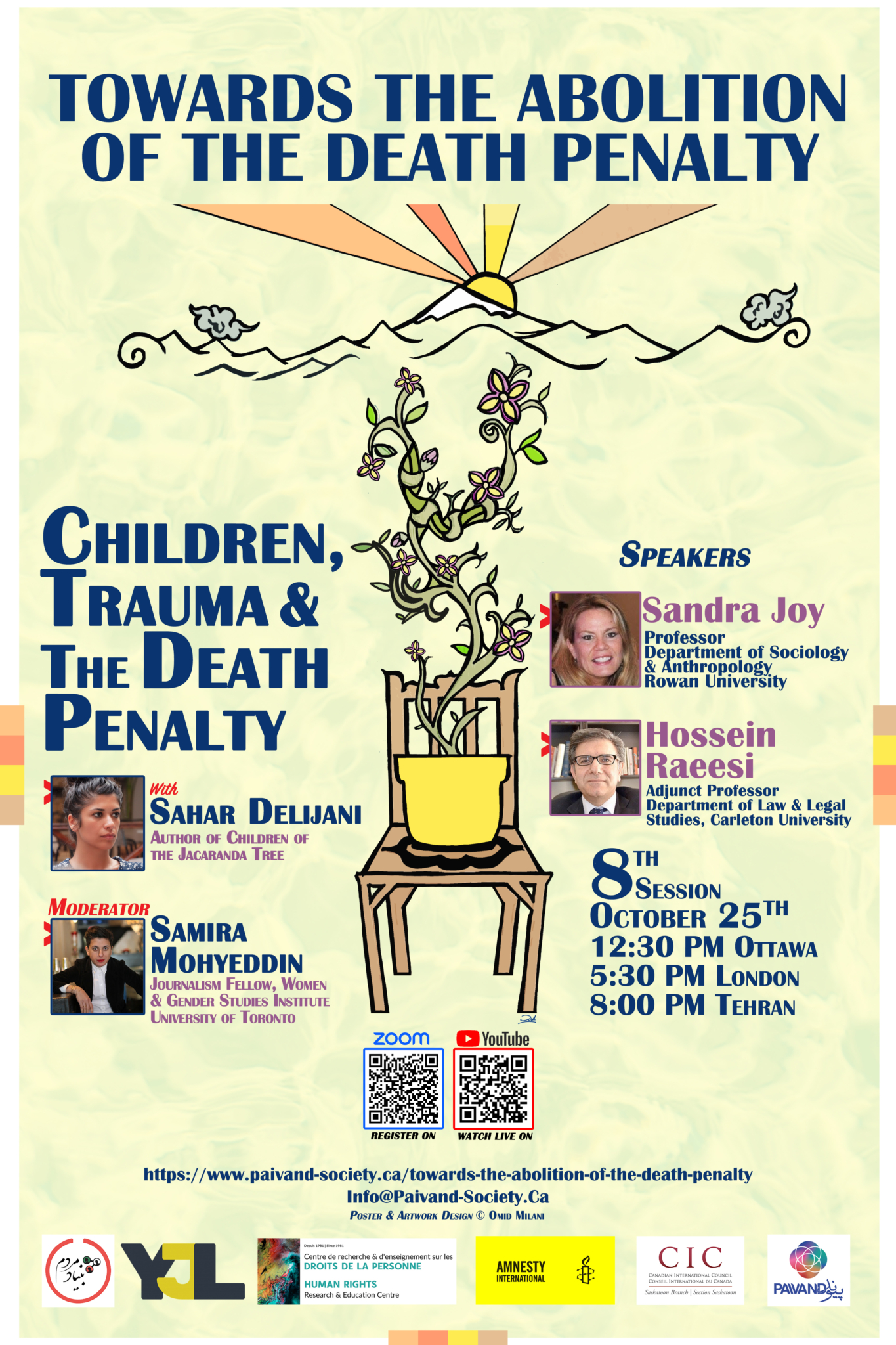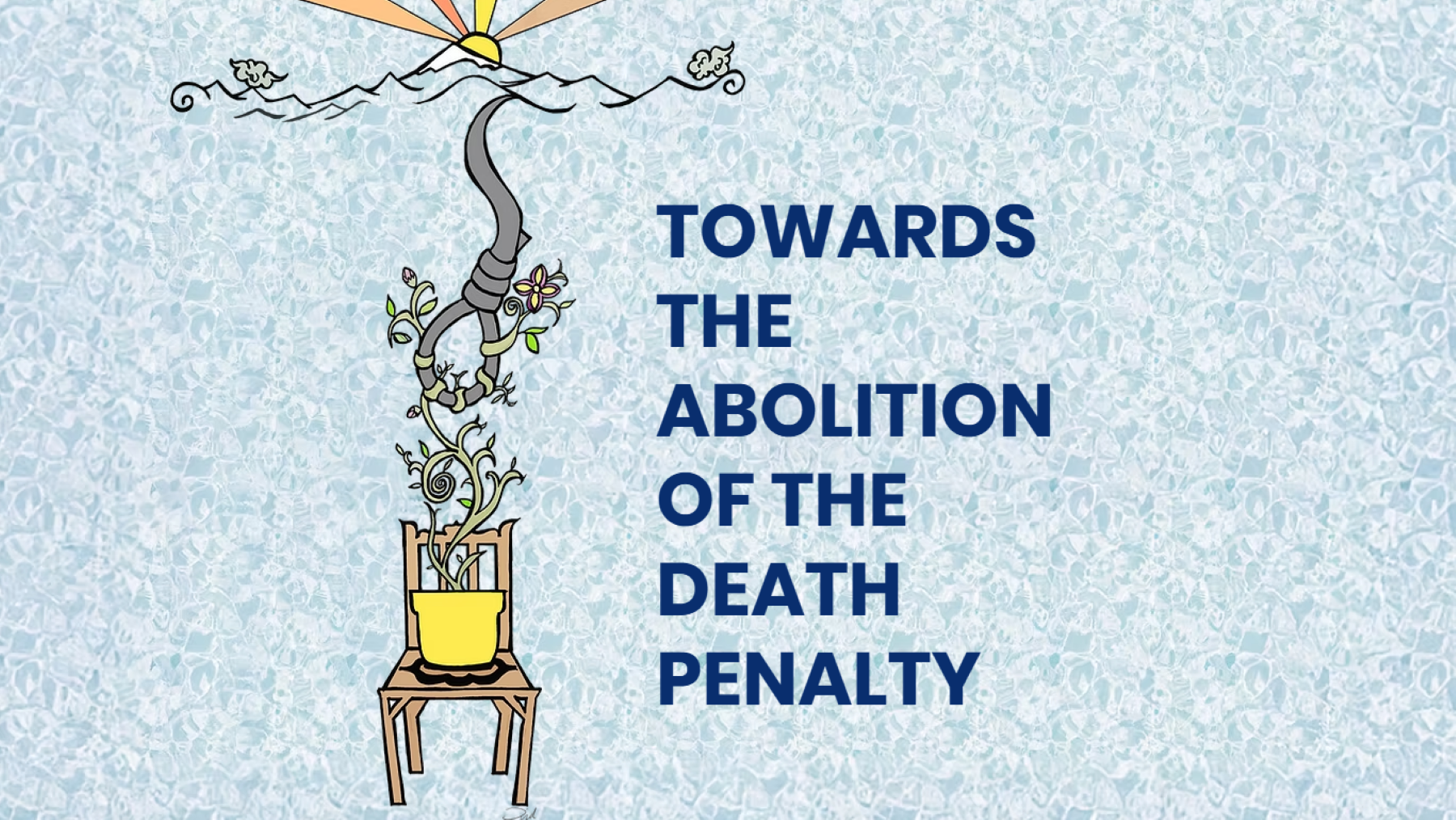Please join us on Saturday October 25, 9:30 PDT, 10:30 CST, 12:30 EDT,1:30 ADTfor the eighth webinar in this ongoing series on the abolition of the death penalty. This series is sponsored by Amnesty International Canada, Carleton University’s Youth & Justice Lab, The Human Rights Research and Education Centre at the University of Ottawa, The Canadian International Council (Saskatchewan Branch), The Mardom Foundation, The Paivand Society and the campaign United Against Executions in Iran.
Children are generally considered exempt from criminal liability for evident reasons, including their lack of maturity, competence, and, consequently, a fully formed criminal mind in the strict sense of the term. The UN Convention on the Rights of the Child (1989) defines a child as “every human being below the age of eighteen years unless under the law applicable to the child, majority is attained earlier.” Iran, for example, is a party to the Convention but has signed the Convention under a reservation to its provisions. In practice, several individuals convicted of crimes committed while under the age of eighteen have been held in custody until reaching legal adulthood and subsequently executed by the Iranian state. This session examines the issue of executing minor offenders and considers the broader effects of the death penalty on children across various contexts. It also offers an argumentative framework for abolishing the death penalty for children, in light of, among other perspectives, trauma-informed practice.
.
Our Webinar Panelists and Moderator
Sahar Delijani is the author of Children of the Jacaranda Tree, an internationally acclaimed novel, translated into thirty-two languages and published in more than seventy-five countries. Delijani’s writing has appeared in The New York Times, Literary Hub, McSweeney’s, BOMB, The Kenyon Review and more. Born in Iran, Delijani grew up in California and lived for many years in Turin, Italy. She currently lives in New York City.
Hossein Raeesi: Mr. Raeesi has practiced Criminal and Human Rights law in Shiraz, Iran for 20 years and served as a board member of the Fars Province Bar Association for two terms. He was the founder and former head of the Human Rights Committee of the Fars Province Bar Association for eight years. He is also the founder of Neday-e Edalat (The Voice of Justice) Legal Association in Shiraz. In his practice as a lawyer, as pro bono counsel, he has defended political prisoners, journalists, women, LGBTQs, minorities, students and children who were sentenced to the death penalty. In this regard, he has been credited with winning several high profile cases dealing with controversial issues like capital punishment, stoning of women, child executions, religious persecution, domestic and gender based abuse, discrimination and much more. Given the high-profile cases he has worked on, he came under the scrutiny and pressure of the Iranian government leading to his immigrating to Canada. In Canada, Mr. Raeesi continues to advocate for human rights issues, being a go-to legal expert on issues of criminal law, criminal procedure, and their effects on the criminal justice system and civil society. As a consultant on foreign legal issues, he has been working with the Office of the United Nation High Commissioner for Human Rights (OUNHCHR), and Amnesty International. He has written many legal commentaries on the protection of human rights in the administration of criminal justice on topics such as torture, brutal punishments, death penalty and the need for focus on restorative justice. His academic and legal career has focused on the study and practice of Islamic Laws (also referred to as Sharia Law), children’s rights, and women’s rights, including domestic violence. He has provided expertise on Islamic Laws in my various roles in Canada and in Iran where he was a legal expert and an expert witness. His most recent areas of research are Children’s Rights, Capital Crimes, the Islamic Legal System, Sharia Law, and the Islamic Criminal Justice System. In 2015, Mr. Raeesi was selected by a joint committee of University of Ottawa and Carleton University to be their one-year In-House Scholar and Visiting Professor. In this role, he appeared at several speaking engagements and weekly panels, and conducted various research projects. He also teaches a comparative course on human rights within Sharia law and Islamic legal systems.
Professor Sandra Joy: Dr. Sandra Joy is a Sociology Professor who has been on the faculty at Rowan University since 2002, teaching courses such as Race & Social Justice, Families and Children of the Incarcerated, and The Sociology of Death, Dying, & Bereavement. In 2002, she received her Ph.D. in Sociology from Temple University, and in 1990, she received her M.S.W. from Norfolk State University. Dr. Joy is also a Licensed Clinical Social Worker with a dozen years of experience as a mental health and substance abuse therapist. As a therapist, she worked with individuals, families, and couples, including children and adolescents, in a variety of outpatient, partial hospitalization, and inpatient settings. She most enjoyed her work as a reentry counselor with currently and formerly incarcerated addicts. For several decades, whether Dr. Joy was working in the mental health field or within academia, she has maintained her work as a community activist. She has been an abolitionist in the anti-death penalty movement throughout this time and served for many years on the Board of the Campaign to End the Death Penalty (CEDP). She is a member of the Philadelphia Coalition Against Death by Incarceration (CADBI). She serves as a member on the Board of the Kalief Browder Foundation and is an Advisory Board member for the Petey Greene Program. Dr. Joy is the author of Coalition Building in the Anti-Death Penalty Movement: Privileged Morality, Race Realities (2010) and Grief, Loss, & Treatment for Death Row Families: Forgotten No More (2014). She is a co-author of her most recent book publication, titled Life Without Parole: Worse than Death? (2022).Her current research project focuses on the vicarious trauma experienced by those who witness executions. “
Our moderator Samira Mohyeddin has a Master of Arts in Modern Middle Eastern History and Gender from the University of Toronto and Genocide Studies from the Zoryan Institute. She is the inaugural 2024 / 2025 Journalism Fellow at the University of Toronto’s Women and Gender Studies Institute. Samira is an award-winning journalist and producer. For nearly ten years she was a producer and host at CBC Radio and CBC Podcasts. She resigned in November of 2023 and founded ‘On The Line Media’.

Upcoming webinars in this series on the abolition of the death penalty
Towards the Abolition of the Death Penalty is a virtual panel discussion series that will tackle the complex question of the death penalty with a view to its abolition in retentionist states, particularly in the contemporary context of the Middle East, in Iran, Saudi Arabia, Afghanistan, Egypt, Syria, and Iraq. The panel series will provide in-depth discussions on the death penalty from diverse legal, philosophical, sociological, psychological, and political perspectives. The speakers will address and put in context current instances of the death penalty, exploring the dynamics involved in this criminal sanction. The series aims to create a dialogical platform for everyone interested in engaging with the abolitionist discourse to discuss the possibilities and challenges to put an end to the death penalty. Each session will introduce the audience to significant aspects of capital punishment, expounding theoretical and practical particularities of the sanction.
November 29 – Session 9, Sociological Perspectives
Hosein Ghazian, Iranian Sociologist, Theorist, Commentator, Researcher, Author, Photographer
Saeed Paivandi, Professor of Education, University of Lorraine
December 10 – Session 10, Non-Violence and Forgiveness (Human Rights Day)
Payam Akhavan, Massey Chair in Human Rights, human rights lawyer, University of Toronto
Ramin Jahanbegloo, Director of ‘Mahatma Gandhi Centre for Nonviolence and Peace Studies, New Delhi, Visiting Professor, St. Andrews University
Omid Milani, Fellow, Human Rights Research and Education Centre, Artist, University of Ottawa
Note: dates and speakers subject to change
Poster & Artwork Design © Omid Milani





















